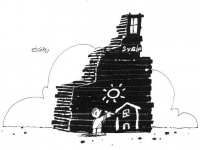Politics
Sakharov Prize laureates discuss the importance of press freedom
On Sunday 3 May 2015
USPA NEWS -
The European Parliament has awarded the Sakharov Prize for Freedom of Thought to several journalists and advocates of freedom of press since it was launched in 1988. We talked to some of those laureates about their experiences, current challenges and the importance of the press.
Ali Ferzat, a Syrian cartoonist and Sakharov Prize laureate in 2011, recalls how he tried to avoid media control for years in Syria by using symbols instead of words. “I have deliberately used symbols in my cartoons in order to overcome the barrier of censorship prior to publication, but I was still occasionally called in by the intelligence services because of my critical cartoons, which generally found favour with the public,“ he said. He had to flee his country and now lives now in exile in Kuwait, after being badly beaten by a militia group loyal to the Assad regime and left on the streets for dead in 2011.
Razan Zaitouneh, a Syrian journalist, who was also awarded the Sakharov Prize in 2011, was kidnapped in a rebel-held area in the suburbs of Damascus in December 2013 and her whereabouts and captors are still unknown. “The most important thing defining the freedom of press is to convey the truth,“ stresses Zhanna Litvina, from the Belarusian Association of Journalists who was awarded the Sakharov Prize in 2004. “If you witness [something] with your own eyes and if you're professional, then you must write about that truth.“
“Without free press, that is to say, the capacity to properly inform the public and provide citizens debates with necessary insights, democracy is amputated,“ said Salima Ghezali, an Algerian journalist, writer and women's rights activist and the Sakharov Prize laureate in 1997. Litvina, who is the chair of the Belarusian Association of Journalists since 1995, has followed the media situation in the country for decades.
She said that Belarus's “information space“ has been dominated by the state-owned media outlets: “We lost many independent newspapers after the 2001 [presidential elections]. Either they stopped their activities or the state forced them to close down.“ She added that the situation of internet media has got worse as government agencies can close down an internet news portal without having to go to court.
“In a way being a journalist today is more difficult than it was 20 years ago,“ said Ghezali, blaming “the multiplication of conflict zones from where it's impossible to report correctly, the deterioration in political ethics within the dominant elite and the growing job insecurity“. Christophe Deloire, secretary general of Reporters without Borders, an organisation which received the Sakharov Prize in 2005, said: "The situation should be better thanks to new technologies that open new doors for freedom of the press."
However, new technologies are also being used to control freedom of information while “old violence“ against journalists remains very high. “It´s as if we are entering into a new era of propaganda because it´s very easy today for different powers, governments or radical groups, to avoid and suppress journalistic information and then spread propaganda directly through websites or other means and claim it is information." He continued: “The challenge is to support independent information against 'information' sponsored by powers or interests. Societies need journalism as a third party to see the world as it is and not as powers, governments, firms and religious groups want us to see it.“
Liability for this article lies with the author, who also holds the copyright. Editorial content from USPA may be quoted on other websites as long as the quote comprises no more than 5% of the entire text, is marked as such and the source is named (via hyperlink).






